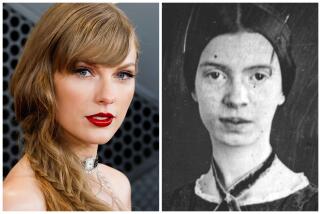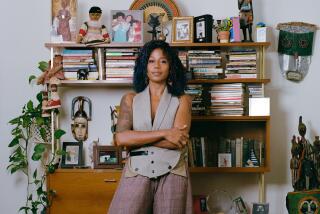The Genius of Emily Dickinson
In a letter to a friend, Emily Dickinson once described her heart as a miser. But if you have read any of her poetry you know that’s not so.
She was an eccentric --for which we can be thankful--and she knew it and suffered with it:
Much Madness is divinest Sense
To a discerning Eye--
Much Sense--the starkest
Madness--
‘Tis the Majority--
In this, as All, prevail--
Assent--and you are sane--
Demur--you’re straightway
dangerous--
And handled with a Chain.
If you don’t know Dickinson’s story or have forgotten it, let me go into it briefly before I discuss some of the marvelous readings of her poems that are available on audio cassette.
She was born in 1830 into one of the leading families of Amherst, Mass. Her father, Edward, was a stern Yankee lawyer whose heart, Emily once said, was “pure and terrible.”
She went to an academy and to one year of college at Mount Holyoke before coming home and living the rest of her life in her parents’ house. In her later years, she wore only white and was known as “the myth of Amherst” because she was sighted so rarely. She worked in her garden and, it was learned later, wrote steadily.
There is only one known photograph of Dickinson, taken when she was about 18. That was about the time she began writing poetry, though she apparently destroyed much of the work done in her 20s.
It was not until 1862, when she was 31 and the Civil War was tearing the country apart--”and so many young men of Amherst would never again return to the counter and the plow,” as Genevieve Taggard wrote in a breathtaking 1931 biography--that Dickinson got up the nerve to send off a few poems to Thomas W. Higginson, an editor and Unitarian clergyman who had written an article that Dickinson saw in a magazine.
Higginson did not encourage her to write more poetry because the style was so unorthodox (though after her death, he helped bring out the first collection of Dickinson’s poems in 1890).
In all, fewer than 20 of Dickinson’s poems were published in her lifetime. But after her death in 1886, her sister found 1,775 poems locked away in a trunk in the Amherst house they shared as spinsters. More than 900 of them had been carefully bound by the poet into 60 volumes with hand-sewn cloth covers.
It was an astonishing discovery and ultimately led to an appraisal of Dickinson as one of America’s greatest poets.
Here is my favorite from the batch:
“Hope” is the thing with feathers--
That perches in the soul--
And sings the tune without the words--
And never stops--at all--
And sweetest--in the Gale--is heard--
And sore must be the storm--
That could abash the little Bird
That kept so many warm--
I’ve heard it in the chillest land--
And on the strangest Sea--
Yet, never, in Extremity,
It asked a crumb--of Me.
This was a genius, clearly, and if you need more proof, you should also read some of her letters, especially those to Higginson and to her friend Abiah Root.
Or rather, you should listen to them.
In another example of how audio literature can surpass the power of the page, audio cassette versions of Dickinson’s letters and poems are so enjoyable that you will want to carry a couple of cassettes in your briefcase or on a long trip just to be sure you have an antidote to the world’s mindless intrusions.
Listen, for example, to Alexandra O’Karma read Dickinson for Recorded Books. The first time I heard her voice I had a vision of myself walking down a leafy sidewalk in Amherst on a summer’s evening and passing a two-story house where a young woman is reading poetry by an open window.
O’Karma’s is a cultured voice that comes out almost in a monotone. Yet, instead of putting you off, that monotone holds you, mesmerizes you, as each four- or six- or eight-line poem comes floating out like a lovely butterfly or a lonely moth.
O’Karma’s readings are on two cassettes from Recorded Books and rent for $7.50 a month; the better deal is to purchase them for $15.95.
The most famous reader of Dickinson is the actress Julie Harris. Her readings for Caedmon are very special because of the fragile quality of Harris’ voice. These readings are available on several cassettes sold separately, and they are most easily obtained from Books on Tape or The Audio Partners. The prices vary a bit but are comparable to those cited above from Recorded Books.
One thing about listening to Harris, who starred in “The Belle of Amherst” on Broadway: You hear that vulnerable voice and you want it all to turn out so well for Emily. You want to protect this genius whom almost no one knew.
WHERE TO ORDER TAPES:
Recorded Books (800) 638-1304; 270 Skipjack Road, Price Frederick, Md. 20678.
Books on Tape (800) 626-3333; Box 7900, Newport Beach, Calif. 92658.
The Audio Partners (800) 231-4261; 1133 High St., Auburn, Calif. 95603.
More to Read
Sign up for our Book Club newsletter
Get the latest news, events and more from the Los Angeles Times Book Club, and help us get L.A. reading and talking.
You may occasionally receive promotional content from the Los Angeles Times.






